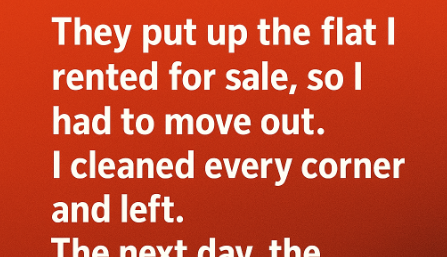When I moved out of my old apartment, I wanted to leave it just as I had found it—clean, peaceful, and cared for. I scrubbed every corner, packed my things, and locked the door one last time. The next morning, my phone rang. It was my landlady.
At first, I worried something was wrong. But instead of complaints, her voice was filled with gratitude. She thanked me for leaving the apartment spotless and asked, with genuine curiosity, “Why did you take so much care when most people just leave a mess behind?”
I smiled and told her that my parents had always taught me to leave every place better than I found it. That little apartment had been my safe space when I moved to a new city, alone and uncertain. Cleaning it wasn’t a chore—it was my way of saying thank you.
There was a pause on the other end of the line. Then she said something that stayed with me.
She shared that the tenant before me had left the place in terrible shape—broken shelves, stained floors, and damaged walls. That experience had left her jaded. She admitted that over time, she began to think most tenants were careless. But after seeing the effort I put in, her view changed.
“You reminded me that people who still care do exist,” she said softly.
The Power of Simple Kindness
After the call, I sat among boxes in my new apartment, reflecting on her words. In a world that moves so fast, where everyone is in a rush, small acts of care often go unnoticed—but they make the biggest difference.
I didn’t expect any reward for cleaning that apartment. Yet knowing that it restored someone’s faith in others brought a quiet joy money couldn’t buy. Sometimes, the good we do ripples farther than we ever realize.
Why Leaving a Place Better Matters
Moving out is always stressful—packing, paperwork, change. But taking time to leave a space clean isn’t just polite; it creates a chain of kindness. The next person walks in and feels welcomed. The owner feels respected. And we, in turn, feel proud knowing we did the right thing.
When landlords repeatedly find damage or neglect, it can build mistrust. One thoughtful act can break that pattern. It’s proof that respect goes both ways—and that compassion still has a place in everyday transactions.
Small Gestures, Big Impact
Kindness doesn’t always come in grand forms. Sometimes, it’s as simple as returning a shopping cart, holding a door, or tidying up after yourself. These moments may seem small, but they shape the world around us. Studies even show that witnessing small acts of kindness makes others more likely to do the same—creating a positive ripple that reaches further than we imagine.
A Lesson That Lasts
For me, this experience became more than just a moving-out story. It reminded me how powerful everyday actions can be. My parents’ simple rule—to leave things better than you found them—has followed me everywhere. It’s a quiet kind of gratitude, one that transforms spaces and softens hearts.
The landlady’s call proved that goodness is contagious. One act of care changed her perception, and her kind words changed my day. That’s how compassion works—it multiplies.
As we rush through life, we often overlook the gentle impact of thoughtfulness. Yet one mindful gesture can rebuild trust, bring comfort, or even renew someone’s belief in humanity.
When I look back, I realize I didn’t just clean an apartment. I closed a chapter with gratitude and opened another with hope. And perhaps that’s what kindness truly is—leaving every place, and every person, a little better than before.




